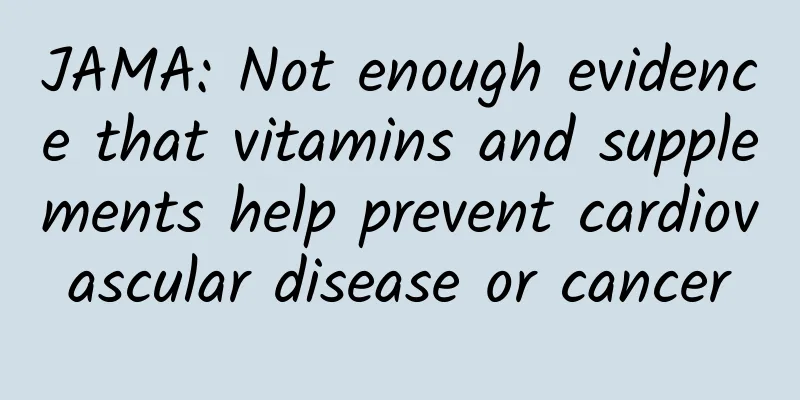JAMA: Not enough evidence that vitamins and supplements help prevent cardiovascular disease or cancer

|
It is reported that in 2021, Americans spent nearly $50 billion on vitamins and dietary supplements. However, scientists from Northwestern Medical University pointed out that vitamins are a waste for non-pregnant, otherwise healthy Americans because there is not enough evidence to show that they help prevent cardiovascular disease or cancer. Data map "Patients are constantly asking, 'What supplements should I take?' They are wasting money and energy thinking there has to be a magic set of pills to keep them healthy when we should all be following evidence-based practices, which is healthy eating and exercise," said Dr. Jeffrey Linder, chair of general internal medicine in the Department of Medicine at Northwestern University Feinberg School of Medicine. Linder and scientists at Northwestern Medicine wrote an editorial published June 21 in JAMA. Based on a systematic review of 84 studies, the new guidelines from the U.S. Preventive Services Task Force (USPSTF) state that there is "insufficient evidence" that taking multivitamins, paired supplements, or single supplements can help prevent cardiovascular disease and cancer in otherwise healthy, nonpregnant adults. "The task force isn't saying 'don't take multivitamins,' but there's this idea that if these things were really good for you then we would know it by now," Linder said. The task force specifically advises against taking beta-carotene supplements – because of the possible increased risk of lung cancer – and against taking vitamin E supplements because it has no net benefit in reducing mortality, cardiovascular disease, or cancer. “The harm is that in the limited time we see patients to talk to them about supplements, we miss out on counseling about how to actually reduce cardiovascular risk, such as through exercise or quitting smoking,” Linder noted. $50 billion In 2021, Americans spent nearly $50 billion on vitamins and dietary supplements. More than half of Americans take vitamins. Why? More than half of U.S. adults take dietary supplements, and supplement use is expected to increase, Linder and colleagues wrote in an editorial in JAMA. They say eating fruits and vegetables is linked to a lower risk of cardiovascular disease and cancer, so it makes sense that key vitamins and minerals could be extracted from fruits and vegetables and packaged in pills, saving people the hassle and expense of maintaining a balanced diet. But they point out that whole fruits and vegetables contain a mix of vitamins, phytochemicals, fiber and other nutrients that may work synergistically to provide health benefits. Isolated micronutrients may work differently in the body than when they are naturally packaged with a range of other dietary components. Linder noted that people with vitamin deficiencies could still benefit from dietary supplements, such as calcium and vitamin D, which have been shown to prevent fractures and possible falls in older adults. The new guidelines do not apply to pregnant women The new USPSTF guidelines are not intended for people who are pregnant or trying to become pregnant, said Dr. Natalie Cameron, co-author of the JAMA editorial and an instructor in general internal medicine at Feinberg University. "Pregnant women should keep in mind that these guidelines do not apply to them," Cameron said. "Certain vitamins, such as folic acid, are essential for pregnant women to help support healthy fetal development. The most common way to meet these needs is by taking a prenatal vitamin. More data are needed to understand how specific vitamin supplementation may alter the risk of adverse pregnancy outcomes and cardiovascular complications during pregnancy." Additionally, recent research from Northwestern University found that most women in the U.S. have poor heart health before becoming pregnant. In addition to discussing vitamin supplementation, working with patients to optimize cardiovascular health before pregnancy is an important component of prenatal care, Cameron said. Eating healthy and exercising is easier said than done "Healthy eating can be a challenge when America's industrial food system doesn't put health first," said Dr. Jenny Jia, co-author of a JAMA editorial examining lifestyle interventions to prevent chronic disease in low-income families. “Eating healthier and getting more exercise is easier said than done, especially among low-income Americans,” Jia said. “Healthy food is expensive, and people don’t always have access to an environment where they can exercise — maybe it’s not safe to go outdoors or they can’t afford a facility. So what can we do to try to make it easier and help support healthier decisions?” For the past few years, Jia has been working with charitable food pantries and banks that provide free food to those in need, trying to help customers pick healthier options from the food pantry and educate those who donate money to provide healthier choices. From cnBeta.COM |
Recommend
How to configure IP server rental?
When renting a server, we often hear about IP con...
To Mi Meng, free poison, paid aphrodisiac
Some people say that content monetization is noth...
Do you really understand "The Great Wall"?
Recently, Lao Mouzi has used his big move again.....
Chaohu Mini Program Production Company, how much does it cost to make a luggage mini program?
How much does it cost to produce the Chaohu lugga...
Lei Zi Doudian no source 3.0 upgrade practical gameplay
Douyin course catalog: Lesson 1: Ideas and core es...
Where's my nose? Why can't I see it?
Audit expert: Liu Dongbao Chief Physician of Opht...
Chengdu's tea tasting agent with the most repeat customers is announced
Take-out is available in the store, agent: 193-82...
CTR: Panoramic insights into the digitalization of car life in 2022
Research background and definition of car life di...
Volkswagen plans to cut 30,000 jobs and save $3.9 billion in expenses
Volkswagen announced on Friday that it will cut u...
When the fans of the original novel meet the fans of the adaptation, who will win?
The American TV series Game of Thrones, adapted f...
Fired on the third day of probation?
Recently, there was a very popular post on the V2...
How much does it cost to develop the Wenshan bargaining app? How much does it cost to develop the Wenshan bargaining mini program?
The main factors affecting the price of mini prog...
EleCloud review: a mobile power bank with storage and sharing functions
First of all, let me make it clear here that EleC...
Essential information for APP promotion and operation: the most comprehensive and complete online event planning guidance program!
Event operation is an explosive operation method ...
Do you really understand the hardships of operating new media in an enterprise?
NO.1 Corporate self-media is job self-media, not ...









